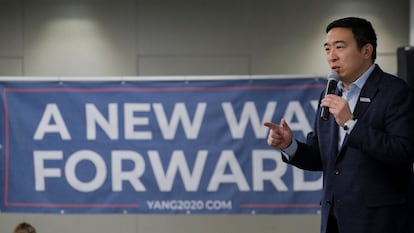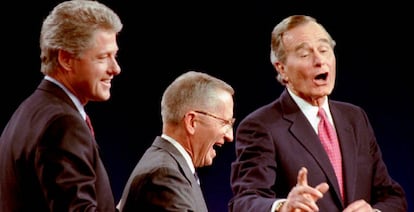‘Not left. Not right. Forward’ – The third party that wants to end American political polarization
Billionaire Andrew Yang is the driving force behind the Forward Party, a coalition offering an alternative to bipartisan acrimony


“Third parties are like bees: once they have stung, they die,” American historian Richard Hofstadter (1916-1970) once said. Whenever some political group in the United States tries to chart a course outside the lines drawn by Republicans and Democrats, someone inevitably quotes Hofstadter’s dictum on the life cycle of alternative political parties. They are born, they grow up, they take a swipe at the left or the right, and then they disappear.
Andrew Yang is a 47-year-old millionaire businessman and the face of the new Forward Party. He thinks things will be different this time around, and is confident that the irreconcilable hostility between the two mainstream camps will compel voters who are fed up with dysfunctional politics to seek a “Third America.”
Yang is well acquainted with defeat. He fell by the wayside in the 2020 Democratic presidential primaries, and lost in the New York City mayoral race the following year. But his advocacy of a universal basic income and his pragmatic, optimistic positions during those campaigns gained him a loyal base of supporters. Yang left the Democratic Party in October 2021 and registered a Political Action Committee (PAC), the first step in political fundraising. In July, the Forward Party, the Renew America Movement, and the Serve America Movement announced the formal merger of the three organizations into a new American political party.
Yang shares the leadership of the Forward Party with Christine Todd Whitman, a former Republican governor of New Jersey. In his speech to launch the Forward Party, Yang said: “Americans can solve ANY problem.” People are fed up with “rigid platforms, monolithic, top-down organizations… and obsolete, extremist political parties that are incapable of offering solutions.”
The American people want changes to the rules of its democracy, such as a non-partisan primaries, a ranked choice voting system like the one Alaska debuted this summer, and independently designated electoral districts instead of the ones gerrymandered by Republicans and Democrats for their own benefit. And according to a 2021 Gallup poll, a record two-thirds of Americans want a third party.
American history is littered with failed third parties. Why would this time be any different? “Because the two traditional parties are more interested in getting us on their side and dividing the American people than solving problems and bringing us together,” Joel Searby, the national political director of the Forward Party, told EL PAÍS. “This is a unique moment in our history and voters are ready. We finally have a critical mass of real talent, money, and the will to work hard for a third way.”
Searby is right about the funding – they already have $5 million in the campaign coffers. “Money will not be the problem,” Yang says. The party also has a slogan: “Not left. Not right. Forward.” On September 24, the Forward Party held its national kickoff event in Houston, Texas. So far, they have more than 75,000 volunteers across the country, people like young Curtis Harrison, who recently hosted the Colorado chapter’s monthly meeting in his living room.
There was history made in Houston this weekend as @FWD_Texas @Fwd_Party launched with hundreds of fired up Americans ready for a new brand of politics. Let’s build the movement the country needs. ⬆️🇺🇸 pic.twitter.com/EYIjwAB0XZ
— Andrew Yang🧢⬆️🇺🇸 (@AndrewYang) September 27, 2022
It was a virtual gathering of about 25 people scattered across a state, in which Biden beat Trump by almost 15 percentage points. Harrison explained that the Forward Party would be endorsing candidates running in the November midterm elections, and encouraged everyone to suggest names. “We will have minimal involvement in those campaigns, but we will enthusiastically support those we endorse,” said Searby, who also said that “we will in no way align with anyone [like Donald Trump] who denies the legitimacy of the 2020 election results.” The Forward Party plans to have a presence in 30 states by the end of 2023, and in all 50 states by the end of 2024. But they are not focused on having a candidate in the 2024 presidential election. “We prefer to work at the local level,” said Searby.
Washington reacted with skepticism to the launch of the Forward Party. Renouncing the mainstream parties and espousing irreproachable ideals is all well and good, say the pundits, but you have to get down to specifics, and so far, Forward hasn’t done that. “We know they don’t want polarization, that they don’t like extremism. But their main obstacle is the system itself,” says historian Michael Kazin, from Georgetown University, whose latest book, What It Took to Win, is a history of the many ups and downs of the Democratic Party since its inception in the early 19th century. “Becoming a political group with national scope is difficult in this country,” said Kazin, “because to qualify for ballot placement, a party must meet certain requirements that vary from state to state. Republicans and Democrats set it up that way to avoid competition. I see the Forward Party as a tough one to pull off, but I’m a historian, not a prophet.” Searby optimistically replied: “Yes, everything is designed to prevent us from achieving our goals, but it’s not impossible. And we’re in it for the long haul.”
Because they have not put forth a specific platform, it’s still unclear whether Yang and the Forward Party would do more damage to the Democrats or the Republicans. In the United States, bipartisanship is almost as old as the nation itself. Founded in 1828, “The Democratic Party is the world’s oldest mass political organization,” writes Kazin. The Republican Party, founded in 1854 by anti-slavery activists, is almost as old.
Some of the most recent and notable third party presidential candidates were George Wallace, who helped Nixon win in 1968; Ralph Nader hurt Al Gore’s presidential run in 2000; and Ross Perot was in the mix for both of Bill Clinton’s victories, although there is still debate as to whether he was responsible for George H. W. Bush’s dashed re-election hopes. Perot is also proof that voting for alternative parties can be futile. In 1992, Perot won 20 million votes (18% of the popular vote) that “translated into exactly zero electoral votes,” said Kazin.

Professor Dan Schnur, from the University of California, has worked as a strategist on four presidential and three California gubernatorial campaigns, always with Republican candidates. The current polarization “paves the way for building an alternative, but it’s still too early to tell whether the alternative will be this one [the Forward Party],” said Schnur. “The viability of a third party depends on how extreme the other two candidates are.” He cites the example of Michael Bloomberg, who dropped out of his 2020 run for the White House when it became clear that the Democrats would nominate Biden, a centrist, and not left-leaning Senators Bernie Sanders or Elizabeth Warren. Schnur notes that “modern political history shows that the most successful challengers to this duopoly are the most confrontational and combative candidates... those who practice ‘middle finger’ politics.” Schnur ran in 2014 as an independent for secretary of state in California, “with dramatic results,” he joked. “When Republicans and Democrats are more moderate, there is less of a gap in the middle.”
Early on in his career, Schnur briefly advised the backers of an initiative that garnered some press attention this summer. No Labels has demonstrated an impressive ability to collect signatures (more than 100,000 in Ohio alone) and raise funds ($46 million in 10 months). That money would only be used if “two extreme candidates were to run in the 2024″ presidential election, such as Donald Trump versus Bernie Sanders, who has already made it clear he has no intention of running for president. If that happens, No Labels will allocate funding to support “more reasonable” candidates who appeal to “voters in the middle.” They have studies indicating that 64.5 million Americans would support such an effort.
Tu suscripción se está usando en otro dispositivo
¿Quieres añadir otro usuario a tu suscripción?
Si continúas leyendo en este dispositivo, no se podrá leer en el otro.
FlechaTu suscripción se está usando en otro dispositivo y solo puedes acceder a EL PAÍS desde un dispositivo a la vez.
Si quieres compartir tu cuenta, cambia tu suscripción a la modalidad Premium, así podrás añadir otro usuario. Cada uno accederá con su propia cuenta de email, lo que os permitirá personalizar vuestra experiencia en EL PAÍS.
¿Tienes una suscripción de empresa? Accede aquí para contratar más cuentas.
En el caso de no saber quién está usando tu cuenta, te recomendamos cambiar tu contraseña aquí.
Si decides continuar compartiendo tu cuenta, este mensaje se mostrará en tu dispositivo y en el de la otra persona que está usando tu cuenta de forma indefinida, afectando a tu experiencia de lectura. Puedes consultar aquí los términos y condiciones de la suscripción digital.








































